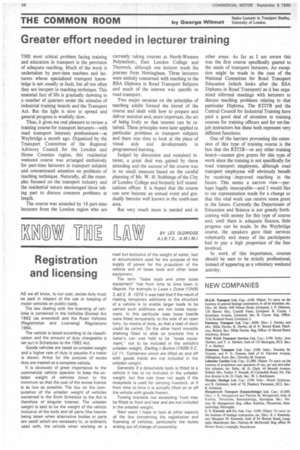THE COMMON ROOM
Page 70

If you've noticed an error in this article please click here to report it so we can fix it.
by George Wilmot
Senior Lecturer in Transport Studies, University of London.
Greater effort needed in lecturer training
THE most critical problem facing training and education in transport is the provision of adequate teaching. Much of the work is undertaken by part-time teachers and lecturers whose specialized transport knowledge is not usually at fault, but all too often they are inexpert in teaching technique. This essential fact of life is gradually dawning in a number of quarters under the stimulus of industrial training boards and the Transport Act_ But the light is slow to spread and general progress is woefully slow.
Thus, it gives me real pleasure to review a training course for transport lecturers—with road transport interests predominant—at Weybridge a month ago. Organized by the Transport Committee of the Regional Advisory Council for the London and Home Counties region, this residential weekend course was arranged exclusively for part-time lecturers in transport subjects and concentrated attention on problems of teaching technique. Naturally, all the examples focused on the transport industry and the residential nature encouraged those taking part to discuss common problems at length.
The course was attended by 18 part-time lecturers from the London region who are currently taking courses at North-Western Polytechnic, East London College and Thurrock, although one lecturer made the journey from Nottingham. Three lecturers were entirely concerned with teaching in the RSA Diploma in Road Transport Subjects and much of the interest was specific to road transport.
Two major sessions on the principles of teaching adults formed the kernel of the course and dealt with how to prepare and deliver material and, more important, the art of being lively so that interest can be retained. These principles were later applied to particular problems in transport subjects and there was time to look at the place of visual aids and developments in programmed learning.
Judged by discussion and sustained interest, a great deal was gained by those attending and the success of the course was in no small measure based on the careful planning of Mr. W. H. Stebbings of the City of London College and formerly IoT examinations offieer. It is hoped that the course can now become an annual event and gradually become well known in the south-east area.
But very much more is needed and in other areas. As far as I am aware this was the first course specifically geared to the needs of transport lecturers. An exception might be made in the case of the National Committee for Road Transport Education (which looks after the RSA Diploma in Road Transport) as it has organized informal meetings with lecturers to discuss teaching problems relating to that particular Diploma. The RTITB and the Central Council for Industrial Training have paid a good deal of attention to training courses for training officers and for on-thejob instructors but these both represent very different functions.
One of the barriers preventing the extension of this type of training course is the fact that the RTITB—or any other training board—cannot give grants for this type of work since the training is not specifically for road transport employees, although road transport employees will obviously benefit by receiving improved teaching in the future. This seems a narrow view—perhaps legally inescapable—and I would like to see representation made for a change so that this vital work can receive some grant in the future. Currently the Department of Education and Science is not greatly forthcoming with money for this type of course and, until there is adequate finance, little progress can be made. In the Weybridge course, the speakers gave their services voluntarily and many of the participants had to pay a high proportion of the fees involved.
In work of this importance, courses should be seen to be strictly professional, instead of appearing as a voluntary weekend activity.






















































































































